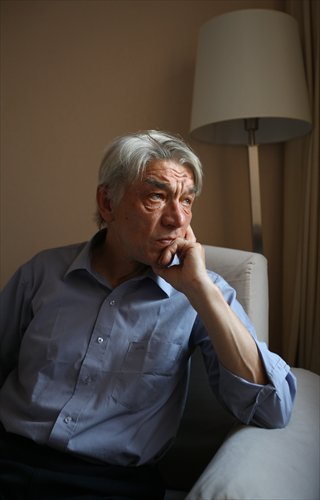Wolfgang Kubin discusses his controversial views on
Wolfgang Kubin discusses his controversial views on Chinese literature

Wolfgang Kubin Photo: CFP
The name Wolfgang Kubin is not an unfamiliar one for the Chinese public. For many, he is known as "the German who slammed Chinese contemporary literature by calling it 'trash.'"
The news media loves Kubin, or Gubin as he is known in Chinese. Frank and straightforward, his words can easily become a mind-blowing headline that ignites widespread discussion across the nation.
Though the "trash theory" was later proved to be a misinterpretation taken out of context, the 71-year-old sinologist from Bonn University and Beijing Foreign Studies University is still regarded by many as a controversial figure in the field of Chinese literature criticism.
"Chinese contemporary writers know nothing about humanity."
"Post-1949 Chinese literature is trash."
Those are just a few of his remarks, which, due to the professor's habit of speaking briefly, come across as baseless judgments and offensive elitism to those who have seen his interviews.
Elite literature
Some doubt that Kubin is qualified to judge Chinese literature, often taking the stance that he "is indeed an expert on ancient Chinese poetry, but that doesn't mean he is an expert on contemporary literature" and that his conclusions are often "too assertive."
When asked how he views the criticism against him, Kubin told the Global Times in an e-mail interview that he is open to any kind of criticism.
"Criticism is something good. One can learn from it. I am always learning. It helps me to understand why people misunderstand me.
"I do not play any role, I do not maintain any position. My voice does only speak when asked for. When speaking I am typical German: To be outspoken is typical German," he wrote.
"If I am wrong or right is a question of my readers or listeners. They have to decide. I listen to them and sometimes change my mind."
This willingness to listen could be seen in 2012 when Mo Yan became the first-ever mainland author to win the Nobel Prize for Literature, Kubin, who had previously claimed Mo's works "bore him to death" in a Deutschland Radio interview, said he decided to reconsider his views.
However, years later he still insists he was right about Mo.
"Mo Yan and Yu Hua are totally outmoded. They write in the style of 19th century (Europe) or in the style of the Ming-(1368-1644), Qing-Dynasty (1644-1911). In the 80s they were avant-garde, now they are completely backward."
Public disputes over the critic's harshness towards Chinese contemporary literature hit a peak in 2006 when Kubin made some sour remarks about several big names in Chinese contemporary literature.
He mentioned that writers such as Su Tong and Yu Hua are "more popular writers than serious ones" in Germany. Many Chinese readers found it infuriating to have names long known as the country's best stamped on by a foreign professor, leading some to accuse him of being "a believer in elitism with little regard for rustic works."
Kubin admitted that he is indeed a firm supporter of elitist literature.
"Do you like to watch Third-League soccer or Champions League? Of course I prefer elitist literature and elitist language just as I prefer the Champions League in soccer."
He also maintains that literature should aim to be international rather than stuck at home.
"As soccer even in China is international, literature has to be international, too," he explained.
"Otherwise it is not even Third League."
So after all the ugly slashes, just what does Kubin think is "good literature?"
"Literature should be for (wo)man, child, animals, the air, the water, the stones and the plants," he wrote.
"All the stories about 'him' and 'her' are boring. It is always the same stuff. Good literature now concentrates on 'it' in 100 pages."
When asked if, by his definition, there were any Chinese writers who really understand humanity, Kubin named one, "Wang Jiaxin. He is superb in writing about human beings."
Unlike his often critical attitude towards most modern Chinese writers, Kubin showed great respect for the 59-year-old Chinese poet.
"I'm moved by his poems about people in and outside of China. When translating I am crying. He is a poet of (wo)men."
Currently, the professor is preparing his second volume of Wang's poetry in German.
Vicious circle
As a translator who has dedicated himself to introducing Chinese literature to Germany for decades, Kubin also talked about the challenges he has faced trying to introduce the world to Chinese literature.
"According to theory only a country that translates can develop. Since 1979 China is developing because it is translating," Kubin wrote.
"But the problem is: China does not regard translation as art. This is why only youngsters translate, youngsters without any experience and therefore producing poor translation."
Kubin is right about the vicious circle in the Chinese translation market. While China is eagerly trying to get its voice heard by desperately exporting its literature to overseas countries, literature translation pays quite poorly. Therefore, experienced translators often focus their energies on lucrative projects while inexperienced ones flood in to produce poor translations that only serve to worsen the situation.
It seems a similar situation exists when it comes to Chinese translations of German literature.
"Most of the contemporary literature written in German is totally unknown in China. Reason is that all those teaching German at Chinese universities are too lazy. They frankly told me: Translating something does not mean you get anything, no money, no position."
Kubin told the Global Times that even though he is a veteran he does not get paid for many of his translations and that sometimes he even uses his own money to publish them.
"I translated Gao Xingjian's Bus Station with my students into German. I paid a lot of money to a publisher and finally had the book out."
"In China no one would do something like that," he added.
Newspaper headline: Talking trash